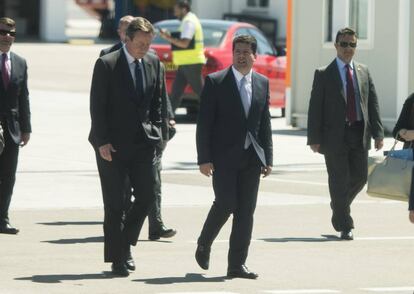Gibraltar after Brexit
This month could see London activate its withdrawal from the EU: bad news for the Rock
Brexit has been bad news for Gibraltar. There is no doubt that once the United Kingdom has left Europe, Spain will recover the right recognized in Article X of the Treaty of Utrecht to control or close access to the British Overseas Territory, which it was unable to do after Spain joined the European Union.

There have already been warnings about the restrictions that Spain could impose on Gibraltarians resident in Spain, as well as the repercussions on Gibraltar itself. The British government is aware of the problems, while the fact that 96% of the electorate in Gibraltar voted to remain indicates that people there are aware of the consequences of Brexit.
It will take time for the United Kingdom to leave the EU, but it will happen
Britain’s repeated promises that it will not hand Gibraltar over to another state or take part in sovereignty talks without its approval do nothing to change the reality of the situation. Gibraltar’s efforts to form a common front with Scotland to remain in the EU will come to nothing, due to its non-autonomous status, nor will its comparisons with Greenland’s approach, which is the opposite of what Gibraltar wants. None of this can avoid the impact of the powers derived from the rights of the EU toward member states in relation to the successive phases of the withdrawal process: from the Council of Europe deciding on the scope of negotiations to its adopting the withdrawal text and even its ratification.
Spanish Prime Minister Mariano Rajoy has said that Gibraltar will leave the European Union with the United Kingdom, and that EU rules will cease to apply from that moment.
But Spain’s recent joint-sovereignty proposal offers a new approach: Gibraltarians would be allowed to apply for Spanish nationality without giving up their British passports; the territory would have autonomy and its own tax regime within the confines of EU legislation, while the border fence would be removed. Spain and the United Kingdom would share responsibility for defense, foreign affairs, borders, immigration and asylum. Spain says this solution would allow Gibraltar to continue to benefit from access to the single market and the free movement of goods and people.
Gibraltar will leave the EU with the United Kingdom
When David Cameron negotiated a new regime for the United Kingdom within the EU, he described it as the best of both worlds, although the British were unable to appreciate it at the time. Post-Brexit, joint sovereignty offers Gibraltar its own version of the best of both worlds.
Its first minister, who has already rejected it, will now have to explain to people there why he prefers to leave the EU rather than remain in it without having to give anything up, why he is turning his nose up at the offer of a privileged status for Gibraltarians, why he doesn’t want to end an out-of-date colonial situation and why he doesn’t want to take advantage of synergies with the Spanish-controlled Campo de Gibraltar, which in the past he has shown an interest in doing. Hiding behind the 2002 referendum that rejected a deal between the United Kingdom and Spain is not enough, given the change that Brexit will mean.
It is no coincidence that the White Paper Theresa May has just presented limits itself to saying that the British government will continue to involve Gibraltar in its working groups, will commit itself to its interests when talks begin, and will strengthen links with it.
It will take time for the United Kingdom to leave the EU, but it will happen. The people of Gibraltar will then face the crude reality of being a non-autonomous territory of a third state, with all the inconveniences and none of the current advantages. The 17th-century Spanish Jesuit writer Baltasar Gracián distinguished between those unable to see the truth because they were concerned only with fighting their corner, from those who prioritized reason over passion. Gibraltar is soon going to have to decide which of those two approaches best represents its interests.
Paz Andrés Sáenz de Santa María is Professor of Public International Law at the University of Oviedo.
This article has been updated at the author’s request.
English version by Nick Lyne.
Tu suscripción se está usando en otro dispositivo
¿Quieres añadir otro usuario a tu suscripción?
Si continúas leyendo en este dispositivo, no se podrá leer en el otro.
FlechaTu suscripción se está usando en otro dispositivo y solo puedes acceder a EL PAÍS desde un dispositivo a la vez.
Si quieres compartir tu cuenta, cambia tu suscripción a la modalidad Premium, así podrás añadir otro usuario. Cada uno accederá con su propia cuenta de email, lo que os permitirá personalizar vuestra experiencia en EL PAÍS.
¿Tienes una suscripción de empresa? Accede aquí para contratar más cuentas.
En el caso de no saber quién está usando tu cuenta, te recomendamos cambiar tu contraseña aquí.
Si decides continuar compartiendo tu cuenta, este mensaje se mostrará en tu dispositivo y en el de la otra persona que está usando tu cuenta de forma indefinida, afectando a tu experiencia de lectura. Puedes consultar aquí los términos y condiciones de la suscripción digital.








































